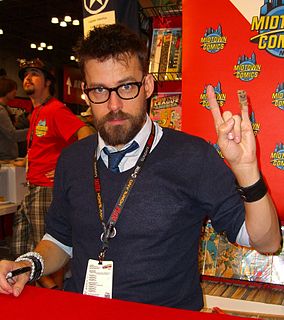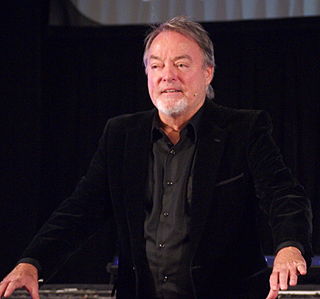Top 976 Editor Quotes & Sayings - Page 17
Explore popular Editor quotes.
Last updated on December 4, 2024.
Once upon a time, an editor could try out one or two wacky books, knowing full well that their list would counterbalance any risk with a stable of best-sellers and safe bets. Nowadays, every book must earn its own bread. With low overheads and an often episodic operating status, the small independent press is nicely placed to snap up the most innovative literature going at the moment. To take the risks. Meaning that small presses are no longer just outfits set up to publish your or your friends' work. They have something genuinely important to offer.
In fact, Lig never formally resigned his editorship—he merely left his office late one morning, and has never returned since. Though well over a century has now passed, many members of the Guide staff still retain the romantic notion that he has simply popped out for a sandwich and will yet return to put in a solid afternoon's work. Strictly speaking, all editors since Lig Lury Jr., have therefore been designated acting editors, and Lig's desk is still preserved the way he left it, with the addition of a small sign that says LIG LURY, JR., EDITOR, MISSING, PRESUMED FED.
The most famous self-made man in the world today is our own Edison. Talk with Mr. Edison and he will tell you he owes much if not most of his success to omnivorous reading. Forbes is one of his favorite publications. How closely he reads it can be gathered from a letter just received from him in which he asks the editor to forward a long analytical letter to the writer of a series of articles which contained two figures Mr. Edison questions, and he wants to know exactly on what authority or investigation they were based. Both letters were the product of Mr. Edison and were signed by him.
The fact that I am constantly immersed in the act of legal writing and editing has made me a better and more efficient creative writer and editor. In the end, lawyers need to tell compelling stories when they write a brief or other legal argument. A successful lawyer understands that the judge is merely a person who is going to read that brief, which should articulate a compelling reason for the judge to rule in that lawyer's favor. In other words, a legal advocate needs to get the judge to care. That's not dissimilar to what a creative writer does.
I think I became a better writer after I started writing for the New Yorker. Well, I know I did. And part of it was having my New Yorker editor and part of it is that was when I started really going on tour and reading things in front of an audience 30 times and then going back in the room and rewriting it and reading it and rewriting it. So you really get the rhythm of the sentences down and you really get the flow down and you get rid of stuff that's not important.
Much of an editor's job is in fact pretty nanny-like in nature: in many ways, you're there to protect and defend, to reassure and clean up. What I ask from writers is respect. I want them to respect me enough to turn in a clean draft. I want that draft to be as good as they can make it. I want to feel the thought behind those words. And I want it to be turned in on time. It drives me wild when I get a story that's obviously slapped together, and the same can be said for a manuscript; you should respect your reader enough to give her something that reflects your best efforts.
There is more than one way to burn a book. And the world is full of people running about with lit matches. Every minority, be it Baptist/Unitarian, Irish/Italian/Octogenarian/Zen Buddhist, Zionist/Seventh-day Adventist, Women's Lib/Republican, Mattachine/FourSquareGospel feels it has the will, the right, the duty to douse the kerosene, light the fuse. Every dimwit editor who sees himself as the source of all dreary blanc-mange plain porridge unleavened literature, licks his guillotine and eyes the neck of any author who dares to speak above a whisper or write above a nursery rhyme.
[A comic book writers' union] will never happen. Someone will always be willing to write Batman for free. ... You sit at a bar with an editor at a show and you see 19 people come up and pitch ideas at them. If everybody writing the top 20 books all quit and demanded, 'Union now, union forever,' those 19 guys would be getting phone calls. There will never be a union. I think things are getting better - I bet things have never been so good - but there will never be a union.
I wanted an agent who would actually sell stuff. After two British agents failed comprehensively, I was reading Locus (the SF field's trade journal) and noticed a press release about an experienced editor leaving her job to join an agent in setting up a new agency. And I went "aha!" - because what you need is an agent who knows the industry but who doesn't have a huge list of famous clients whose needs will inevitably be put ahead of you. So I emailed her, and ... well, 11 years later I am the client listed at the top of her masthead!
What do you have in mind after you graduate?" What I always thought I had in mind was getting some big scholarship to graduate school or a grant to study all over Europe, and then I thought I'd be a professor and write books of poems or write books of poems and be an editor of some sort. Usually I had these plans on the tip of my tongue. "I don't really know," I heard myself say. I felt a deep shock, hearing myself say that, because the minute I said it, I knew it was true.
The format of the book was the idea of my wonderful editor, Stephen Segal. Stephen and I had worked together before, on projects for the Interstitial Arts Foundation, and when he got the idea for an accordion-style book, he called and asked if I could write the story for it. I told him that I would love to try! And I knew it had to be a love story, because that's the sort of story you really want to hear from both perspectives. I mean, imagine if Pride and Prejudice were told from Darcy's perspective as well as Elizabeth's. It would be quite a different story!
Now, almost twenty years since my last job in book publishing, I know that there are far more socially inept people in book than in magazine publishing. At the time, however, I just didn't feel I was enough: smart enough, savvy enough, well read enough, educated enough, charming enough. Much of this was probably because I was very naive, and didn't really know how to behave in an office. This made me a terrible assistant, which in turn made me a terrible junior book editor.
My job is to cover the hell out of the story, very aggressively. The real place to be courageous if you're a news organization is where you put your people to cover the story. It's making sure that you have people going to Baghdad. It's making sure that you figure out how to cover the war in Afghanistan. While the journalist in me completely stands with them, the editor of the New York Times in me thinks my job is to figure out what the hell happened and cover the hell out of it, and that's more important than some symbolic drawing on the front page.
I tend to write things seven times before I show them to my editor. I write them seven times, then I take them on tour, read them like a dozen times on tour, then go back to the room and rewrite, read and rewrite... I would never show him a first draft, because then he's really going to be sick of it by the twelfth draft.
While I was still going to embrace social media, I knew I had to do things that nobody else was doing. I decided I had to meet as many people as I could - face to face. While most artists would email galleries, I would show up in the lobby. Instead of liking an art show or exhibition, I would go there and meet everyone. And while most would send a magazine a press kit, I go and meet the editor. This notion of face to face contact became my mantra.
Parker wasn't supposed to be a series. He was supposed to be one book, and if he was only going to be in one book, I didn't worry about it. And then an editor at Pocket Books said "Write more books about him." So I didn't go back at that point and give him a first name. If I'd known he would've been a series, I would've done two things differently. First, I would've given him a first name because that means for 27 books, I've had to find some other way to say, "Parker parked the car."













